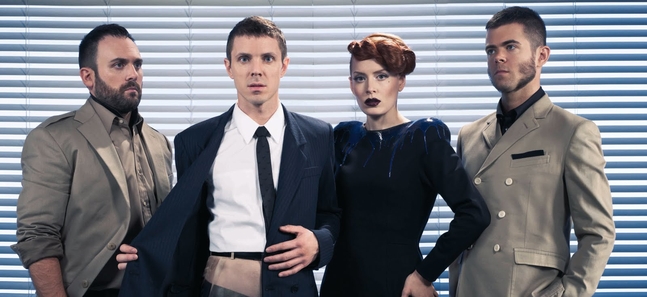Scissor Sisters: the interview, part 2
'We're not the first cowboys on the rodeo; there are people who have done what we do before us'

Posted: Sun Feb 06 2011
Scissor Sisters' relationship with their fans is famously two-way. Right from the early days, when their gigs would start with the declaration 'We are Scissor Sisters, and so are you', the band have always engaged in a candid conversation with their listeners, sometimes to their own detriment, but always with impeccable regard for honesty. The response to previous album Ta Da was varied, with some fans disappointed by the LP's relatively sombre tone, which was an accurate reflection of the band's exhaustion-induced blues.
Night Work, meanwhile, is a conversely extrospective record built on a sociopolitical thought experiment. Shears has stated that the record was an attempt to imagine a world where one could pick up music where it left off in the 1980s, before a generation of artists was decimated by Aids. It sounds as it should — at once a joyous affirmation of dance music and sex, but with the wry maturity of perfect hindsight.
Was that concept something you specifically considered when writing the songs on 'Night Work'?
JS: It was, absolutely. It was an idea that first crossed my mind when I was in Berlin. Living there for a while, and being heavily immersed in the gay world — there was a real timeless quality to it that got me thinking a lot about gay history and those who had come before. And I really wanted to make a record that spoke to those people that had come before us. You know, we're not the first cowboys on the rodeo; there are plenty of people who have done what we do before us. And without them I don't think there would be this band.
The music is obviously intended to be inspired by that era, rather than being a direct tribute to it.
JS: It has been funny, because on this record — especially in America — this record has been a major beacon for the gays. I really noticed it in America; gay people have really responded to this record and have flooded the shows. And I think that part of what they're responding to is a sense of history on this record and a sense that this band is part of that history — a contemporary version of that history which gay people can claim as their own. And that felt great; that felt really exciting.
Having made a more sexually explicit record, do you feel it speaks more openly to your gay audience?
JS: Quite possibly. I think the sexuality in this record is sort of a response and a reaction to where we were a few years ago. It seemed kinda sex-neutral; I had felt a little bit sexless, like a Barbie doll.
AM: I think it was a little deliberate, because the material on the last album was more emotional and not as sexual, and the themes on that record were a little more melancholy in nature. So I don't think it necessarily lent itself to be super sexual, and I feel like on this one, Jake especially allowed himself to express himself sexually and there is a real — I think — a real sense of liberation in that; it's a really positive thing. One thing that I keep going back to is the fact of how lucky we are, and how lucky Jake is, and Babydaddy and Del, to be in a band and to be honest about who they are and who they love, and to be able to express themselves sexually without fear of success being hindered because of it. I mean, to a certain extent I suppose success still is hindered by it, but there is this real sense of revelry in our shows, and a real sense of gratitude that comes from the audience, because we are able to express this.
Do you feel you learned something about sexuality along the way, or were you more interested in exploring familiar territory?
JS: This is the first record that we've made where I felt like I've come out of my boyhood; I just felt like a little boy for so long, and I don't really feel like that any more; I feel like a grown man. And so I think this is the first writing from that perspective.'
Just as pop goes in cycles, so does history. It's interesting that this album deals with a lost generation when transmission rates for HIV are currently worryingly high across the board…
JS: Yeah, it's something that we've talked about on stage — it's just something that not a lot of people are talking about these days. It's like… I love pornography and I watch it all the time, and I love porn stars; I love the whole porn system. And it's alarming: the stuff that sells the best is bareback porn — I mean it's massive; bareback porn is a massive industry. And I'm not saying that I've never watched it, sure I have. But I find it really sad. And you see guys that are really young, and the youngest you see are like kids — 18 year olds — you just want to reach into the screen and pull them off each other and slap them hard across the face. I don't find it sexy, in fact I find it the opposite; it really turns me off.
AM: There's sort of an attitude within the gay and straight communities that having HIV is a treatable disease — like diabetes or something. And that couldn't be further from the truth. I lost two friends to the virus a couple years ago. It's still taking people. It's really concerning to hear that in America the biggest demographic of new cases are African-American women. It's just shocking, and it's sad, and it's enough to make you want to scream at people and throw condoms at them. It speaks to a little bit of a fatalistic attitude - like people who believe we're living in the end times; it's pretty aggravating.
Especially when people use that fatalism as an excuse to not actually take action.
AM: Absolutely.
The excuse which is trotted out for bareback porn, for example, is that it's supposedly providing a harmless outlet for a taboo fantasy…
JS: But it's not a fantasy because they're real people; they're real human beings. And if people don't think that's an influence or that it fetishises that, then that's very dangerous.
And at the same time, this is something a lot of influential voices don't want to talk about. They don't want to be seen as squares for bringing up a message that took a huge amount of hammering into people's heads for a generation to accept.
AM: Yeah, you don't want to seem like you're on a soapbox and preaching to people, but at the same time I do feel a bit of responsibility by being in the public eye to raise awareness. And I think there is something to that — people are listening to you, so give them something good to listen to! There should be some reason why you're doing what you're doing. And I've lost enough people, and we have no judgements about whether people are positive or negative or what, it's just: let's be honest and try and prevent this from getting worse than it already has. Article continues here...
Tweets
- About Us |
- Work for Time Out |
- Send us info |
- Advertising |
- Mobile edition |
- Terms & Conditions |
- Privacy policy |
- Contact Us
Copyright © 2014 Time Out Tokyo











Add your comment